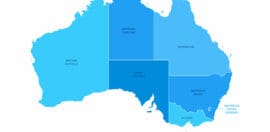ACT crowned Australia’s social progress capital

28 February 2020 at 5:08 pm
Researchers say governments must look beyond simply measuring economic progress
The Australian Capital Territory is Australia’s top ranked region for social progress, while Western Australia and Northern Territory have fallen behind the rest of the nation.
These are the findings from the Australian Social Progress Index (SPI), which offers a holistic measure of the nation’s social performance that is independent of economic factors.
Developed by the Centre for Social Impact (CSI), the tool is designed to help policymakers in different states and territories identify pressing social issues for their region.
“Gross Domestic Product (GDP) can often be a misleading measurement of progress as it tells us nothing about people’s quality of life,” CSI CEO Professor Kristy Muir said.
“Australia has long needed an index that reveals how the people and environment are faring in each of our states and territories – and this is exactly what the SPI does.”
The SPI measures key wellbeing indicators such as personal rights, nutrition and basic medical care, and access to higher education.
First measured in 2015, the ACT has been ranked the top state or territory every year. It came out on top in the indicators of basic human needs, foundations of wellbeing, and opportunity.
In descending order, the next ranked regions are New South Wales, Tasmania, Victoria, South Australia and Queensland.
WA and NT ranked in the bottom two, scoring poorly on several indicators including water and sanitation and access to basic knowledge.
The biggest improvement areas across all states and territories were environmental quality and access to information and communication.
Muir said by comparing regions and tracking them over time, the index showed which areas of social progress were strong and where gaps were.
“The purpose of the SPI is to ensure a clear, singular vision of what social progress looks like in Australia and encourage and support governments to see the gaps and commit to funding and outcomes solutions,” she said.
“Importantly, the findings are reflective of the policies and social contexts of the states and territories, not an indicator of how progressive actual individuals living in those jurisdictions are,” she said.
While the index found social progress was linked to a household’s wealth, it also showed indicators like GDP were not an accurate reflection of the quality of life for Australians.
Lead CSI researcher Dr Megan Weier said she hoped the SPI would help governments look beyond economic indicators and include social progress measurement.
“Countries such as Paraguay have adopted the SPI alongside GDP as its measurable indicator of national development,” Weier said.
“We want to change the conversation around social outcomes and inequality in Australia using relevant facts and data, not just GDP.”
This data follows the release of the 2019 global Social Progress Index last September, which ranked Australia 12th out of 149 countries.









We cant ignore the economic indicators. See https://www.abs.gov.au/ausstats/abs@.nsf/mf/6524.0.55.002